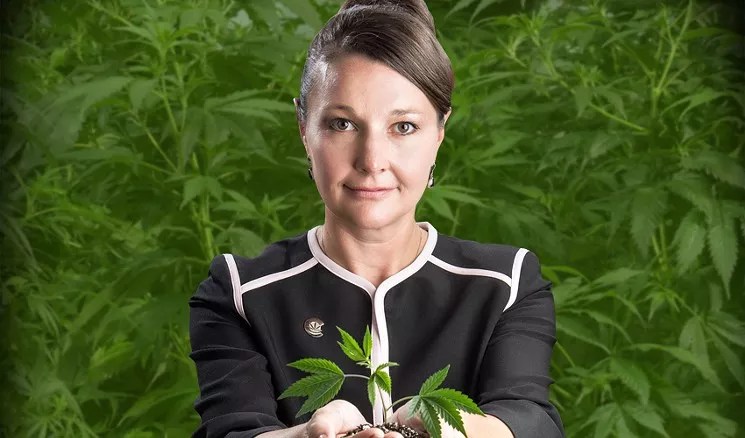
Brandon Marshall

Audio By Carbonatix
The owner of a proposed spa and lounge will submit its application for a social cannabis consumption license to the City of Denver today, February 7. Cindy Sovine, a longtime lobbyist who has recently provided her services to the cannabis industry, says she wants to open Utopia All Natural Wellness Spa and Lounge in the Capitol Hill neighborhood and allow several cannabis-infused activities…if approved by the Denver Department of Excise and Licenses.
The spa would be the first state-licensed cannabis spa in the nation, and Sovine plans to offer infused massages, yoga and other pot-friendly activities, as well as meditation coaching, educational seminars and support and networking groups. There will also be designated consumption areas for vaporizing, but no smoking will be allowed so that Utopia remains in compliance with the Colorado Clean Indoor Act.
Sovine, who became a believer in medical marijuana after using it to help her terminally ill father, hopes the spa can provide an effective alternative treatment for people without connections to cannabis caregivers – but she also wants to give recreational users a place to convene. “Why do you have a glass of wine at night?” she asks, pointing to red wine’s health benefits and mind-altering ability. “I don’t necessarily differentiate between medical and retail consumers.”

Cindy Sovine was lobbying at the State Capitol for health care until turning her attention to cannabis.
Anthony Camera
On top of hosting wellness-inspired cannabis activities and giving consumers a place to vape, Utopia also plans to sell local hemp products, natural health and beauty products, supplements and cosmetics. If Sovine receives a Denver social consumption license, she wants to host pot-friendly cooking classes, corporate retreats and other private functions. “This will be an all-natural wellness alternative, providing a safe place for patients to use while providing activities,” she says. “I’m really excited about this.”
Utopia will be located just two blocks from the State Capitol, at 1244 Grant Street in the Creswell Mansion, a sandstone building erected in the nineteenth century from plans by famous Denver architect John J. Huddart; it’s listed on the National Register of Historic Places. Per Denver license regulations, Utopia had to receive official support from one eligible neighborhood association or business improvement district, but its application will have the support of five: Capitol Hill United Neighborhoods, the Cultural Arts Residential Organization, the Denver Inter-Neighborhood Cooperation, The Shire of Capitol Hill and Unsinkables, Inc.
Sovine was involved in public lobbying efforts for Initiative 300, the voter-approved measure to create a business licensing program for social cannabis use in Denver that was drafted and pushed by cannabis consulting agency Denver Relief. She started putting plans for Utopia in action at the end of the 2017 legislative session, she says, just before Excise and Licenses finalized its social consumption regulations.
“The goal of I-300 was to allow for safe and legal spaces in which adults can congregate and consume cannabis socially,” Denver Relief co-founder Kayvan Khalatbari says in a statement. “Business models like Utopia’s are what we had in mind when we drafted I-300, and I think it’s what the voters had in mind when they approved it. This is a responsible step forward, not just for the cannabis industry, but for Denver.”
The Coffee Joint, Denver’s first business to apply for a social consumption license in December 2017, has yet to hear its fate from Excise and Licenses. Representatives from the department could not be reached for comment on the status of either application.